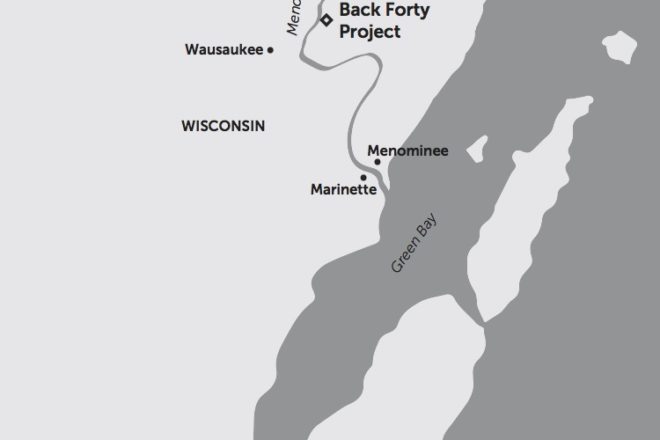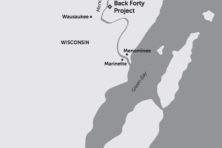Door County Mulls Opposition to Menominee’s Back 40 Mine
- Share
- Tweet
- Pin
- Share

Door County is considering whether to become the last of the three counties in Green Bay’s immediate watershed to pass a resolution opposing a mine proposed near Menominee, Mich., along the Menominee River. Despite the resolutions, Wisconsin governments do not have much say in the permitting process for a mine located in Michigan, even if the mine would affect a waterway shared between the two states.
Local governments, environmental groups and the Menominee Indian Tribe of Wisconsin have criticized the mine for its possible environmental and cultural impacts. The proposed open pit sulfide mine would sit around 150 feet from the bed of the Menominee River.
“People are concerned about what may happen to the river since it flows into Green Bay, Door County, Kewaunee County, Brown County as well as upper Michigan,” said Dave Lienau, Door County board chair and Village Board President of Sister Bay, in a report to the Sister Bay village board.
The mine, operated by Canadian-based Aquila Resources, has received three of the four permits it needs to begin operation. A wetland delineation permit is the final permit that has not yet been issued.
The Menominee Indian Tribe of Wisconsin filed a lawsuit against the Michigan Department of Environmental Quality (DEQ) for issuing a mining permit.
Since the permits started being issued, the Brown County Board, Marinette County Board and the City of Marinette Common Council have all passed similar resolutions opposing the mine.
“The hazardous wastes generated by the mine would degrade water quality and present risks to human health and the environment in Wisconsin, as well as in Michigan,” reads Marinette County’s resolution, which passed unanimously. “The approval of the mine will result in the irreversible loss of significant cultural resources of the Menominee Tribe of Indians of Wisconsin.”
Since the mine is located entirely in Michigan, Wisconsin’s role in the permitting process is small. During the wastewater discharge permit process, the mine was required to adhere to Wisconsin’s water quality standards for discharge, which are stricter than Michigan’s. The Clean Water Act requires impacts on shared waterways to be reviewed by both governing bodies. The wastewater permit was granted in April 2017.
Now that the wastewater permit has been granted, resolutions by local governments in Wisconsin function as requests to an out-of-state government agency. Wisconsin does not have a say in the wetland permit yet to be granted.
“As far as decision-making it’s a Michigan mine,” said Joe Maki, mining specialist with the DEQ. “We don’t have any say in Wisconsin’s wetland permits.”
“Because they’re down to the last permit, there’s an urgency on some of the opponents to bring it up and ask us [the county] to do a resolution against the state of Michigan issuing the final permit,” said Lienau.
Aquila Resources has spent $75 million on the Back Forty mine project in the last 10 years, including water quality monitoring sites required by the permitting process.
The mine will be 2,000 feet wide and 2,500 feet long with a depth of 750 feet. The sulfide found in the rocks around the area are an environmental concern because sulfide reacts with water and air to create sulfuric acid. Environmental groups such as the Sierra Club and Friends of the Boundary Waters claim every single sulfide mine has contaminated surrounding waters.
“People say the Menominee River is very important for fish species and it is connected to the bay, but how a mine can impact that is really hard to quantify,” said Erin Hanson head of Door County’s Soil and Water Conservation Department. “I have reached out to the DNR fisheries biologists and I haven’t gotten a response from them.”
The resolution will be on the agenda for Door County’s Legislative Committee meeting July 18 and will also be discussed at the Land Conservation Committee meeting July 20. If the committees recommend sending the issue to the county board, the board will take it up at its July 25 meeting.




